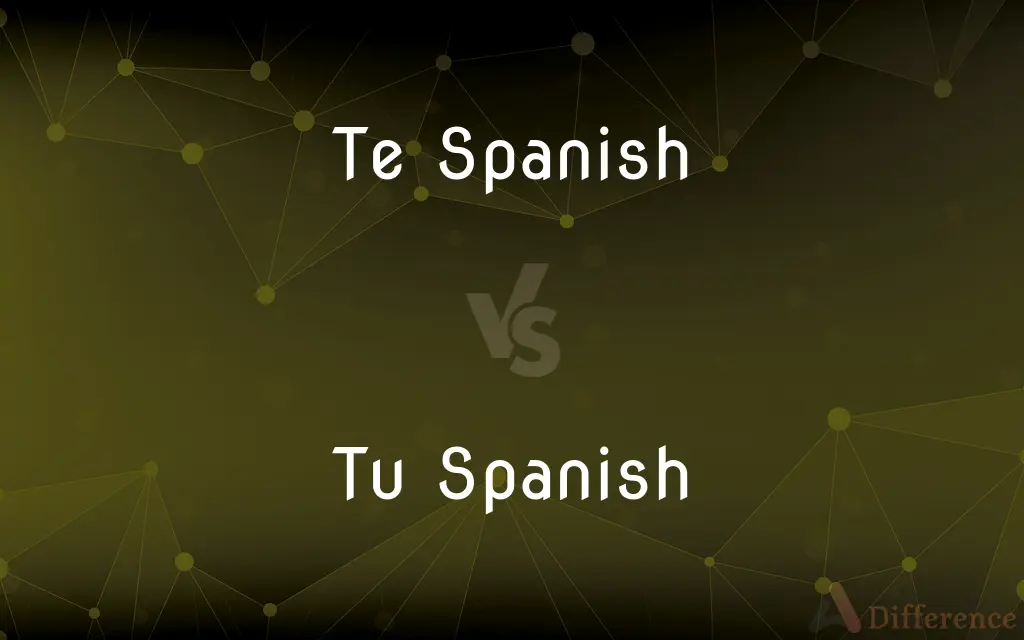Te Spanish vs. Tu Spanish — What's the Difference?
Edited by Tayyaba Rehman — By Fiza Rafique — Published on December 29, 2023
In Spanish, "te" is an object pronoun referring to "you," while "tú" is a subject pronoun meaning "you." "Te" denotes an action towards someone, while "tú" indicates who is performing the action.

Difference Between Te Spanish and Tu Spanish
Table of Contents
ADVERTISEMENT
Key Differences
"Te" in Spanish is an object pronoun, used to denote the receiver of an action. Typically, it translates to "you" in English when referring to the direct or indirect object of the verb. When verbs in Spanish are conjugated, they usually indicate the subject, but "te" helps clarify the object or receiver of the action, especially when emphasizing or avoiding repetition. For instance, "Te amo" means "I love you," where "te" indicates the person being loved.
On the other hand, "tú" in Spanish is a subject pronoun. It's used to indicate who is carrying out the action of the verb. In English, it also translates to "you," but it's used in situations where "you" are the one doing the action. The verbs that follow "tú" are typically conjugated in the second person singular form in the present indicative. For example, "Tú hablas" means "You speak."
It's essential to understand the distinction between "te" and "tú" because, in Spanish, the subject of a sentence can often be inferred from the verb conjugation. Yet, including "tú" or "te" can provide added clarity or emphasis. For instance, "Amo" could mean "I love," but adding "te" before it (Te amo) specifies whom the love is directed towards.
In many Spanish-speaking regions, especially in Spain, there's another form of address, "vosotros," which is the plural form of "tú." While "tú" addresses one person informally, "vosotros" addresses a group informally. Yet, "te" remains consistent in representing the singular "you" as the object, regardless of regional differences.
Interestingly, Spanish also has a formal way to address individuals, using "usted" instead of "tú." This formality is reflected in the verb conjugation and object pronouns as well. While "te" would still be used informally, the object pronoun changes to "lo" or "la" (for him/her or formal you) in formal settings.
ADVERTISEMENT
Comparison Chart
Grammatical Role
Object pronoun
Subject pronoun
English Translation
You (as the object)
You (as the subject)
Usage
Indicates the receiver of the action
Indicates who is performing the action
Example Sentence
"Te veo" (I see you)
"Tú comes" (You eat)
Formality
Used informally
Used informally
Compare with Definitions
Te Spanish
Refers to "you" as the receiver of an action.
Te llamé ayer means I called you yesterday.
Tu Spanish
A subject pronoun in Spanish.
Tú vives aquí means You live here.
Te Spanish
Consistent across various Spanish-speaking regions.
Te entiendo means I understand you.
Tu Spanish
Used in informal contexts to address someone.
Tú eres mi amigo means You are my friend.
Te Spanish
Often used for emphasis or clarity in sentences.
Te quiero mucho means I love you a lot.
Tu Spanish
Commonly used in daily conversation among peers.
Tú sabes means You know.
Te Spanish
An object pronoun in Spanish.
Te escucho means I listen to you.
Tu Spanish
Refers to "you" as the doer of an action.
Tú estudias español means You study Spanish.
Te Spanish
Used to specify the direct or indirect object.
Te compré un regalo means I bought you a gift.
Tu Spanish
Requires verbs to be conjugated in the second person singular.
Tú tienes razón means You are right.
Common Curiosities
How would you say "You eat" in Spanish?
You would say "Tú comes."
Is "tú" used formally or informally?
"Tú" is used informally.
Can you provide an example using "te" in a sentence?
Yes, "Te veo mañana" means "I'll see you tomorrow."
Is "te" always used with verbs in the second person?
No, "te" can be used with verbs in various persons, indicating "you" as the object.
Which one, "te" or "tú," is the subject pronoun in Spanish?
"Tú" is the subject pronoun in Spanish.
Can "tú" and "te" be used in the same sentence?
Yes, for example: "Tú te cepillas los dientes" (You brush your teeth).
Can you provide an example of a question using "tú"?
Yes, "¿Tú quieres café?" means "Do you want coffee?"
What's the main difference between "te" and "tú"?
"Te" is an object pronoun, while "tú" is a subject pronoun.
Are "te" and "tú" used consistently across all Spanish-speaking regions?
While "te" remains consistent, "tú" may be replaced by "vos" in certain regions.
Is "tú" capitalized in Spanish sentences?
No, "tú" is not typically capitalized unless it starts a sentence.
Can "te" be used with "usted"?
No, with "usted," the object pronouns "lo" or "la" are used.
How do you say "I love you" in Spanish?
It's "Te amo."
What is the formal version of "tú"?
The formal version is "usted."
What verb form follows "tú"?
Verbs following "tú" are typically in the second person singular.
Which pronoun, "te" or "tú," would be used to say "I called you"?
"Te" would be used, as in "Te llamé."
Share Your Discovery

Previous Comparison
IMAX 3D vs. Digital 3D
Next Comparison
Barrel Rolls vs. Aileron RollsAuthor Spotlight
Written by
Fiza RafiqueFiza Rafique is a skilled content writer at AskDifference.com, where she meticulously refines and enhances written pieces. Drawing from her vast editorial expertise, Fiza ensures clarity, accuracy, and precision in every article. Passionate about language, she continually seeks to elevate the quality of content for readers worldwide.
Edited by
Tayyaba RehmanTayyaba Rehman is a distinguished writer, currently serving as a primary contributor to askdifference.com. As a researcher in semantics and etymology, Tayyaba's passion for the complexity of languages and their distinctions has found a perfect home on the platform. Tayyaba delves into the intricacies of language, distinguishing between commonly confused words and phrases, thereby providing clarity for readers worldwide.











































